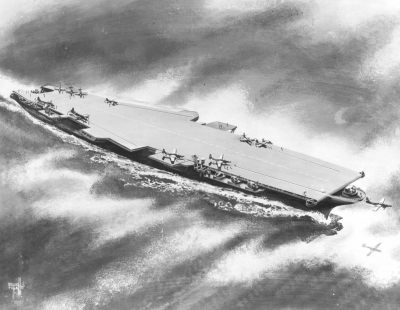The "Revolt of the Admirals" was a policy and funding dispute within the United States government during the Cold War in 1949, involving a number of retired and active-duty United States Navy admirals. These included serving officers Admiral Louis E. Denfeld, Chief of Naval Operations, and Vice Admiral Gerald F. Bogan, as well as Fleet Admirals Chester Nimitz and William Halsey, senior officers in World War II.
The episode occurred at a time when President Harry S. Truman and Secretary of Defense Louis A. Johnson were seeking to reduce military expenditure. This policy involved deep cuts in the Navy, while making the United States Air Force and strategic nuclear bombing the primary means of defending American interests. The Navy sought to carve out a role for itself in strategic bombing, which the Air Force saw as one of its primary roles.
Partly driven by inter-service rivalry, the debate escalated from differences over strategy to the question of civilian control over the military. The cancellation of the aircraft carrier USS United States and accusations of impropriety by Johnson in regard to the purchase of the Convair B-36 Peacemaker bomber led to an investigation by the House Committee on Armed Services chaired by Carl Vinson.
While the dispute was settled in favor of the Truman administration, the outbreak of the Korean War in June 1950 demonstrated the shortcomings of a defense policy primarily reliant on nuclear weapons, and many of the proposed cuts to conventional forces were ultimately reversed.
USS United States (CVA-58) was to be the lead ship of a new design of aircraft carrier. On 29 July 1948, President Harry Truman approved construction of five "supercarriers", for which funds had been provided in the Naval Appropriations Act of 1949. The keel of the first of the five planned postwar carriers was laid down on 18 April 1949 at Newport News Drydock and Shipbuilding. The program was canceled in 1949, United States was not completed, and the other four planned carriers were never built.

1949Apr, 18
The keel for the aircraft carrier USS United States is laid down at Newport News Drydock and Shipbuilding. However, construction is canceled five days later, resulting in the Revolt of the Admirals.
Choose Another Date
Events on 1949
- 1Apr
Communist Party of China
Chinese Civil War: The Chinese Communist Party holds unsuccessful peace talks with the Nationalist Party in Beijing, after three years of fighting. - 20Jul
1948 Arab-Israeli War
Israel and Syria sign a truce to end their nineteen-month war. - 1Oct
Mao Zedong
The People's Republic of China is established and declared by Mao Zedong. - 2Oct
Mao Zedong
The Soviet Union recognises the People's Republic of China, proclaimed the previous day by Mao Zedong. - 14Oct
People's Liberation Army
Chinese Civil War: Chinese Communist forces occupy Guangzhou.

 English
English  español
español  français
français  português
português  русский
русский  العربية
العربية  简体中文
简体中文 